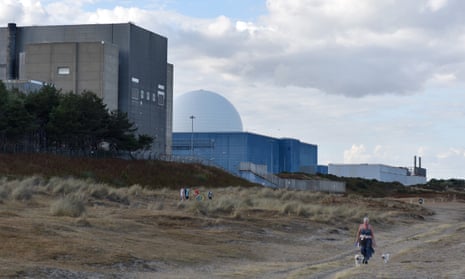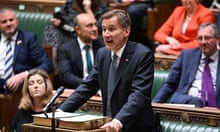Jeremy Hunt hopes to raise £14bn next year after increasing the windfall tax on oil and gas companies and reining in the profits of low carbon electricity generators.
The chancellor also confirmed that the existing windfall tax on North Sea oil and gas operators, the energy profits levy (EPL), will be raised from 25% to 35% and extended by two years, until March 2028.
From 1 January, a tax will also apply to “low carbon electricity generators”, including wind, solar and nuclear, levied at 45%. This is higher than the 40% rate trailed before the budget.
Hunt said he expected the two taxes to raise £14bn next year. Treasury officials will meet energy bosses on Friday to discuss the proposals.
Shares in the power station owners Centrica, Drax and SSE initially fell sharply moments after Hunt’s announcement, but later rallied as it emerged that the energy generator levy would be less onerous than feared. Oil and gas stocks were broadly unmoved.
The chancellor said that most countries were still paying for the consequences of the pandemic and that this had been worsened “by a made-in-Russia energy crisis”.
He had “no objection to windfall taxes if they are genuinely about windfall profits caused by unexpected increases in energy prices. But any such tax should be temporary, not deter investment and recognise the cyclical nature of energy businesses”.
The surge in gas prices, in part fuelled by Russia’s invasion of Ukraine, has handed a surprise lift in profits to oil and gas companies, and generators including nuclear and biomass power stations and windfarms.
The changes mean the EPL will raise a further £20bn over the next six years, to £40bn in total.
The Office for Budget Responsibility estimated that oil and gas tax receipts, including the energy profits levy, will reach £14.9bn this financial year, double its March forecast. It said estimates for 2023-24 had quadrupled, to £20.7bn including £10.8bn.
“The latter would be an all-time high for oil and gas revenues in cash terms, and the highest as a share of GDP since 1985-86,” it said, adding that volatility in energy prices meant these revenues are “particularly uncertain”.
However, the energy profits levy has been criticised as it does not extend to the excess cash generated by oil and gas giants’ trading, refining and forecourts divisions. Hunt did not alter the levy to reach these windfalls.
Alice Harrison, fossil fuels campaign leader at Global Witness, said: “This so called windfall tax and budget doesn’t go anywhere near what’s needed to protect UK citizens that are being dragged into poverty, and barely touches the sides of the immense profits that energy companies have been amassing.”
after newsletter promotion
The OBR said onshore corporation tax, including the electricity generator levy, should raise £9.9bn next year. The levy is forecast to raise £14.4bn from 2022 to 2028.
The generator levy was not as onerous as companies and investors had feared. The tax will be levied on “extraordinary profits”, made on electricity sold above £75 per megawatt hour. Power currently trades around £260 per MWh.
Energy consultancy Aurora said future UK power prices are trading around £350/MWh and are forecast to remain above £225/MWh, making the levy more generous than the EU’s €180/MWh revenue cap.
The government resisted calls to levy the tax on gas-fired power plants, which have also seen a rise in profits, arguing they were seeing higher costs and were exposed to “unique market risks”. Hydroelectric and battery storage facilities, oil and coal power stations were also omitted.
The move to restrict profits on electricity generators represents a departure from the former prime minister Liz Truss’s plan to cap the revenues of renewable and nuclear power producers from next year, which would have been in line with the EU’s “revenue cap”.









